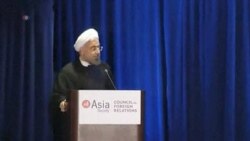Iran’s President Hassan Rouhani and U.S. President Barack Obama spoke by phone Friday, the highest-level contact between the two countries since the Iranian Revolution in 1979. The leaders agreed to work on resolving suspicions that Iran is trying to build a nuclear weapon. The 15-minute conversation was the latest of several steps that may - or may not - indicate a thawing of decades of hostility between Washington and Tehran.
It became a common occurrence in New York - Iranian President Hassan Rouhani walking to the podium, talking about Iran's "real face."
"My government is prepared to leave no stone unturned in seeking a mutually acceptable solution," said Rouhani.
But after a meeting of Iran's foreign minister and world powers, U.S. Secretary of State John Kerry was still skeptical.
"Needless to say one meeting and a change in tone, which was welcome, doesn't answer those questions yet and there is a lot of work to be done," said Kerry.
Iran's foreign minister called the same meeting constructive while sticking to Tehran's bottom line:
"As we move forward, there has to be removal of sanctions, and, in the end game, there has to be a total lifting of all sanctions," said Javad Zarif.
Getting there is still likely to be tricky. Despite Iran's repeated and renewed denials, many in the West aren't convinced Tehran is ready to give up on acquiring nuclear weapons. And Iran's unveiling of new drones, capable of carrying missiles, isn't likely to ease such concerns.
Reaction in Iran has been reserved - seemingly little disappointment a hoped for meeting between President Rouhani and U.S. President Barack Obama failed to materialize.
"If they [the Americans] take one step forward, we'll take two, so that we can achieve a result," said a resident of Tehran.
"The reason we didn't agree to meet them (Americans) is because of their arrogant nature," said another.
Still, during a news conference Friday, President Rouhani said he was satisfied with how things went.
Ellen Laipson is director of the Stimson Center:
"I think he did what he was supposed to do. He made a conciliatory engagement with the world's public - not just the U.S," said Laipson.
Some analysts say the the two leaders' failure to meet shows Iran sees the nuclear talks and relations with the U.S. as two distinct issues that can be addressed separately -- with the nuclear talks taking top priority.
Any final decision on either still resides with the Supreme Leader, Ayatollah Ali Khamenei.
"He's going to test the waters. If it works, he wins," said
Joe Cirincione, who is with the non-profit Ploughshares Fund. "He shows that diplomacy under his rule has worked. If it fails, he also wins. His view the U.S. can't be trusted."
Hanging over the diplomatic efforts are concerns about Israel, which accuses Iran of using this new outreach to stall for more time to build a nuclear weapon. Israeli Prime Minister Benjamin Netanyahu is scheduled to address the U.N. on Tuesday,





